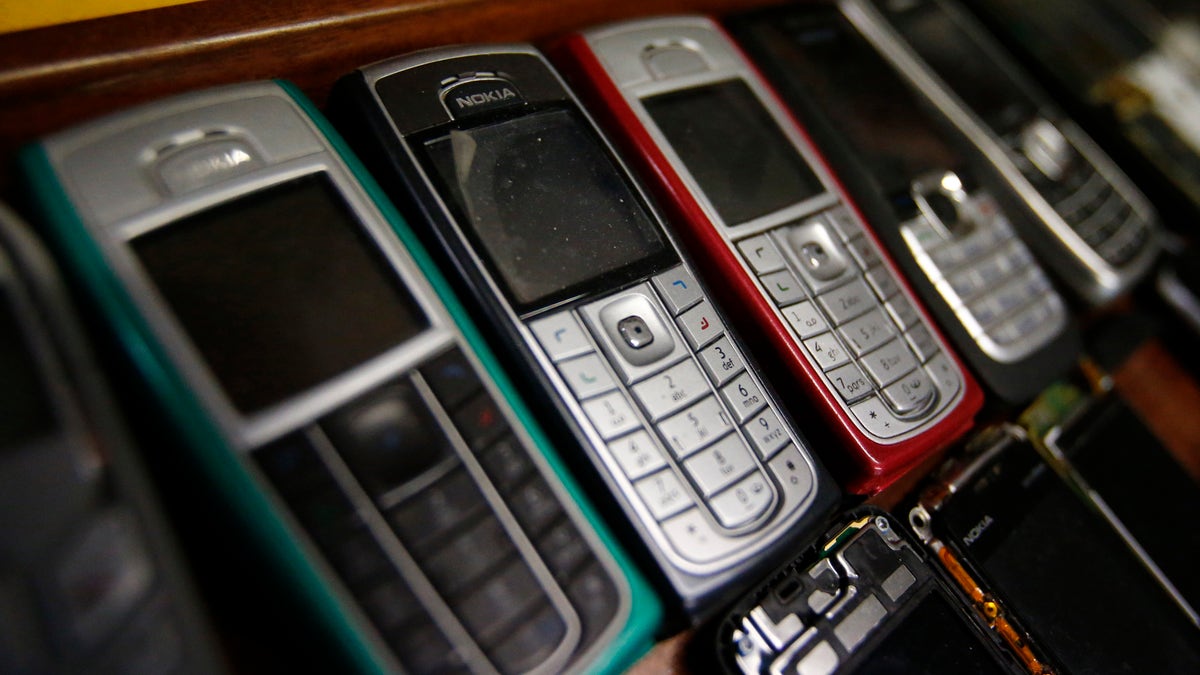
Nokia mobile phones are pictured inside a mobile phone repair service store in the western Austrian city of Innsbruck October 16, 2012. Nokia reported another quarterly loss and dwindling cash reserves October 18, 2012, but results were better than expected ahead of next month's launch of new smartphones it hopes can win back market share from Apple and Samsung. Picture taken October 16. REUTERS/ Dominic Ebenbichler (AUSTRIA - Tags: BUSINESS TELECOMS) - RTR399ZI (REUTERS/ Dominic Ebenbichler)
The first phone call in history happened on March 10, 1876, when Alexander Graham Bell rang up his assistant.
"Mr. Watson - come here - I want to see you," he said.
I wouldn't be surprised to learn that the second call in history took place later that evening, when a telemarketer rang up asking if a Mr. Dell lived at the residence and if he might want to buy some genuine snake oil.
It seems like telemarketing and phones have gone together forever.
That's why I'm always surprised the National Do Not Call Registry didn't come into being until 2004. Since then, it's had a rocky history, and many people still aren't quite sure how it works.
Even after a decade, you'll see myths online about what is and isn't blocked, whether or not cellphones are allowed, rumors that the FTC is about to release your number unless you act right away, etc.
So I'm going to set the record straight and clear up the confusion.
1. How to sign up for Do Not Call
Joining Do Not Call is actually very simple. You go to the website https://www.donotcall.gov/ and enter the landline or cell number you want on the list. There's a quick email verification and you're done.
You can also call 1-888-382-1222 from any phone you want on the list. That's all it takes. Your number stays on the list until you ask for it to be removed or you give up the number.
I should point out that fax numbers have different regulations, so signing them up won't do anything.
Scam warning: You might receive a phone call from someone claiming to work at the Do Not Call Registry or Federal Trade Commission. They'll claim your number isn't listed on Do Not Call and offer to sign you up - you just have to provide some personal information. This is always a scam; just hang up. Learn how to spot and avoid other tricky phone scams.
2. What Do Not Call does and doesn't cover
The Do Not Call list keeps you off of for-profit business call lists, but it isn't immediate. Telemarketers update their lists periodically, so the FTC says it can be up to 31 days before it takes full effect.
If you receive an unexpected sales call after you've registered your number, and you've been on the list for 31 days, you can file a complaint. Just go to donotcall.gov or call 1-888-382-1222. Be prepared to provide the date of the call and the company's name or phone number.
On the other hand, political organizations, charities and survey takers are still permitted to call you. Businesses you've bought something from or made a payment to in the last 18 months also have a right to call. If you ask them not to, however, they must honor your request.
Sometimes on a call from a survey company, they'll ask if they can make a follow-up call. If you agree, then an associated for-profit company can call you with a sales pitch - so, I would politely decline any offers for a follow-up.
Be careful when signing up for sweepstakes and free product offers. The fine print may say the company can send you telemarketing calls.
Under the rules, most businesses can't hit you with prerecorded telemarketing messages, also called robocalls, without your written permission. Political and informational robocalls, such as those received from healthcare providers, banks and schools, are still allowed.
You can block unwanted robocalls to a landline with a service like Nomorobo. On smartphones, you can use blocking, reporting and reverse lookup apps like ones from PrivacyStar.
3. Cellphones and Do Not Call
Every year or so, a hoax burns like wildfire through email inboxes and social networks warning that cellphone numbers are about to go public - register your mobile number right away!
The online rumor also points out that there's a deadline to register your cellphone, and - once registered - it only blocks your number for five years.
For the record, mobile telephone numbers have never been in any danger of being made public or released to telemarketers. There has never been a deadline to register your cellphone. And you don't need to renew every five years (this was a rule for landlines that was axed in 2007).
In fact, even if you DON'T sign up your cellphone, the FTC says that unsolicited telemarketing calls or robocalls to cellphones are illegal. If you're getting unsolicited marketing calls, first ask the caller how they got your number and tell them you don't want to be contacted. If they call back, file a complaint using the information I gave you earlier.
Still, it is a good idea to register all your landline and wireless numbers, because if you do receive a telemarketing call, that's a good sign the person on the other end is a scammer. Legitimate telemarketers play by the rules and don't want to risk a $16,000 fine for disregarding a number on the list.
Telemarketers aren't the only ones who can bug you non-stop. Learn how to stop harassing calls and texts from anyone.
On the Kim Komando Show, the nation's largest weekend radio talk show, Kim takes calls and dispenses advice on today's digital lifestyle, from smartphones and tablets to online privacy and data hacks. For her daily tips, newsletters and more, visit her website at http://www.komando.com.








































